Our neighbors in the next building came over yesterday with an invitation for their niece Meghana's first birthday party. They own the store on our corner where I buy eggs, and run there whenever we are cooking and realize we are out of an essential such as green chillies or ginger (we buy our veggies at a couple different veggie stores a few blocks away).
The party was at a function hall on the street parallel to ours. We arrived with a box of Indian sweets in hand along with a plastic toy drum that we found at the 25 rupee store (not just because we are cheap, but also because we had no idea where else to buy toys of any kind). They ushered us in and the photographer took photos of us with the baby and her aunts. Then we were given cake, then sat around in chairs for a while waving at people we vaguely know from the neighborhood. Then we went outside and helped ourselves to the buffet of yummy Indian food, which was spiced rice, plain rice, an eggplant dish, an aloo (potato) dish, a gobi (cauliflower) dish, curds (plain yogurt), and gulab jamun and another sweet that I believe was Rajasthani (these neighbors are from Rajasthan, a state in the North North West of India, which means they have somewhat different food, customs, clothes, and speak Hindi and not Telugu). There were many women dressed in elegant sarees and my roommates and I, in kurtas and jeans, felt quite under dressed. Many of the Rajasthani women wore the end of the sarees draped over their heads, as is the custom of some.
We talked with the few people we knew (our immediate neighbors, the Punjabi neighbors who live downstairs and run a homeopathic clinic, and Shlayma's boss from her first NGO) and played with the many kids. I chased some kids around the yard until I was tired from running and ice cream mixed with gulab jamun, and then introduced myself to a Muslim woman with 9-month old twins and proceeded to hold them both. Indians LOVE children, maybe more than other people. One of my favorite things about India is that I can go up to people at a party, in a shop, on the street, in a bus - and touch their kids. I can smile and coo and pinch the cheeks of a complete stranger - and often the parents will smile and try and get their kid to say hello back. Sometimes they will hand the kid to me; I've never been refused when I've asked to hold a child. This might not seem so strange, but imagine in America or England if you went up to a child, perhaps with their face turned away from their parents in their arms, or maybe standing alone in a public area - and began to pat them, poke them, pinch their cheeks! (They are big on cheek pinching here; sometimes my coworkers pinch my cheeks.)
It was quite a shindig, especially for a first birthday party. There was music and a catered buffet and nearly 100 people, and the baby changed clothes at least twice... good times.
Monday, March 31, 2008
Saturday, March 22, 2008
One day in Hyderabad
I went on a day-long tour with Robyn, a friend of an Asmita funder who was in town visiting.

The tour guide was really funny - though, apparently, only to me and Robyn. He kept yelling "Challo! Ayie!" ("Let's go! Please come!") every five minutes.
The White Temple was built in the 1970's. You take off your shoes to enter and get to enjoy walking barefoot on the smooth cold white Marble.
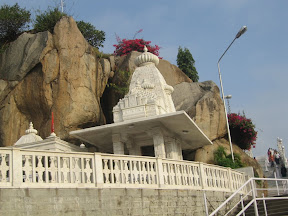
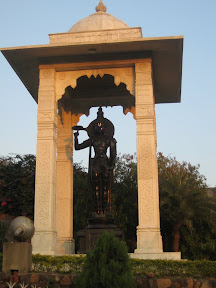
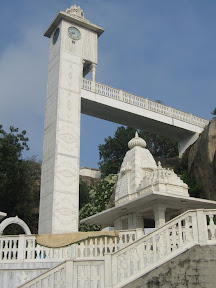
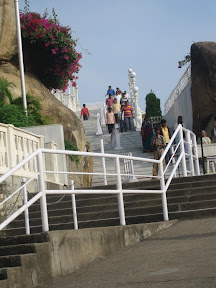
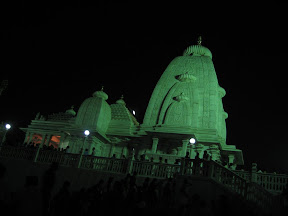
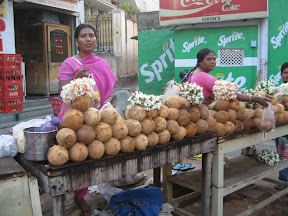
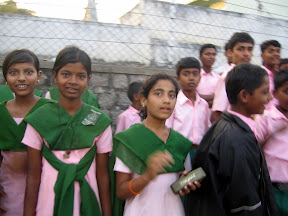
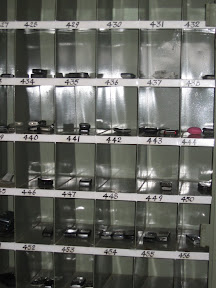
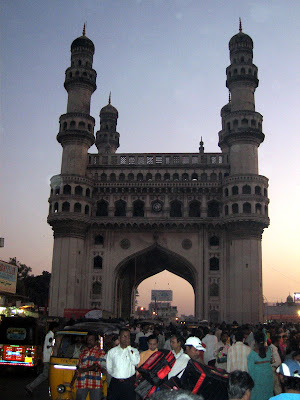
The Nizam Museum
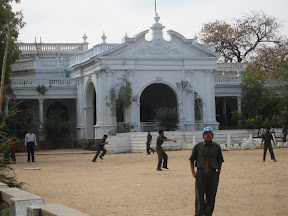
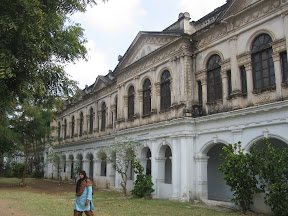
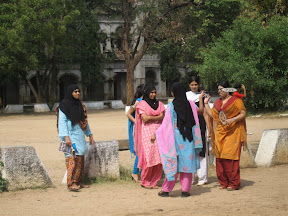
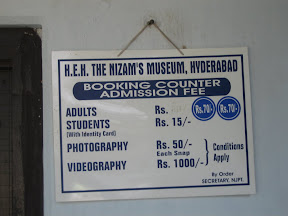
Lots of places in India charge extra above the ticket price for cameras and video cameras. Also many sites charge tourists ten times more than Indians. I made my case for paying Indian prices - I work and live in India - and everywhere but Golkonda let me in at Indian ticket price.
Nizam Palace
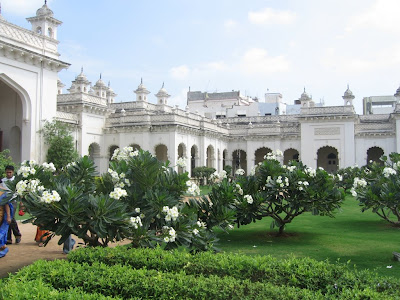
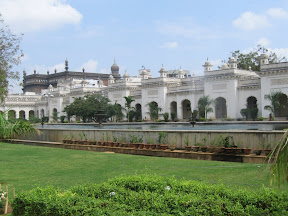

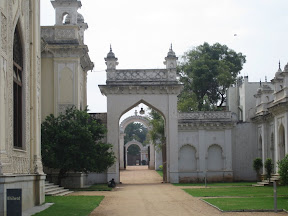
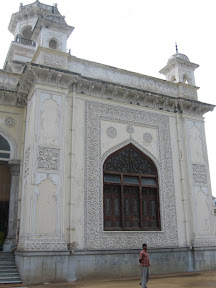
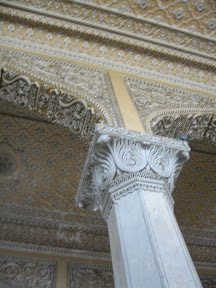
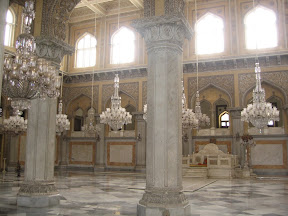
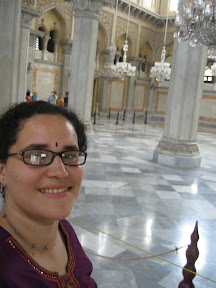
We stopped for a much-needed lunch at a restaurant with a veg buffet. I was eating with my hands (as is the tradition in South India) and felt something in the baigan bartha that didn't feel like eggplant. I brought it up to the counter and asked them what it was. "It's Brinjal ('eggplant' in India English), ma'am." "No," I said. "This is meat." About five other workers came over and began to examine the hunk of flesh on my plate, and finally came to the conclusion that it's mutton (lamb). Another worker made a new plate from the buffet for me and tried to hand it to me, but I refused to take it. I had almost finished eating anyway, and could easily make myself another plate if I had wanted (after all, that's how I got the first two plates, isn't it). As I am used to complaining at restaurants both because I work in one and because I was vegan for five years and got used to sending about 50% of food ordered at restaurants back for alterations, I went on. "There was mutton in my brinjal! This is a veg buffet!" I said. "This is India! You can't do this here!" As if I had said the magic words, a worker refunded my buffet money (to Robyn, who had paid) and gave both me and Robyn mango ice cream with carmalized apricot (mmmmm). Seriously though... who does that in India.
Golkonda Fort
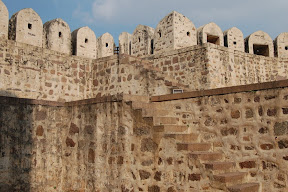

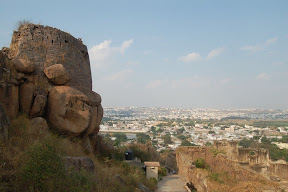
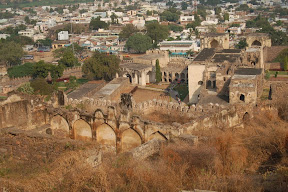

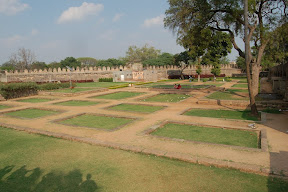
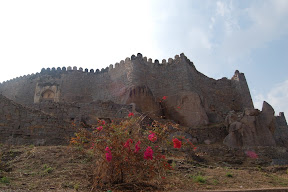
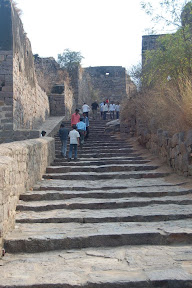
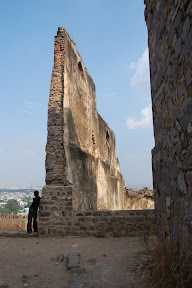
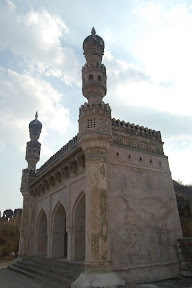
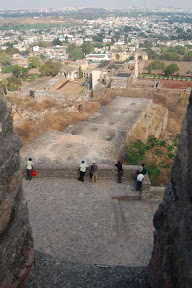

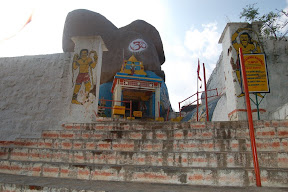
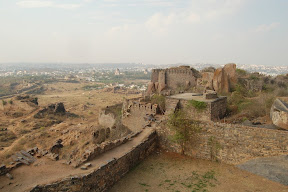
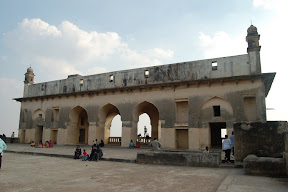
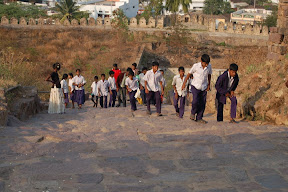
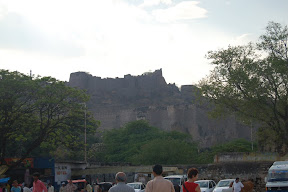
Golkonda is beautiful. There are around 350 stairs to get to the top. The Temple is on the way up, the pavilion building structures are at the top, and has giant Andhra rocks everywhere. There were a handful of teenage boys trying to take out photo or trying to take photos with us (we refused, but allowed some girls to take photos with us). There were many young couples here, and at the other sites we visited, seemingly hiding in a tourist venue where no one they know would find out about their secret trysts.
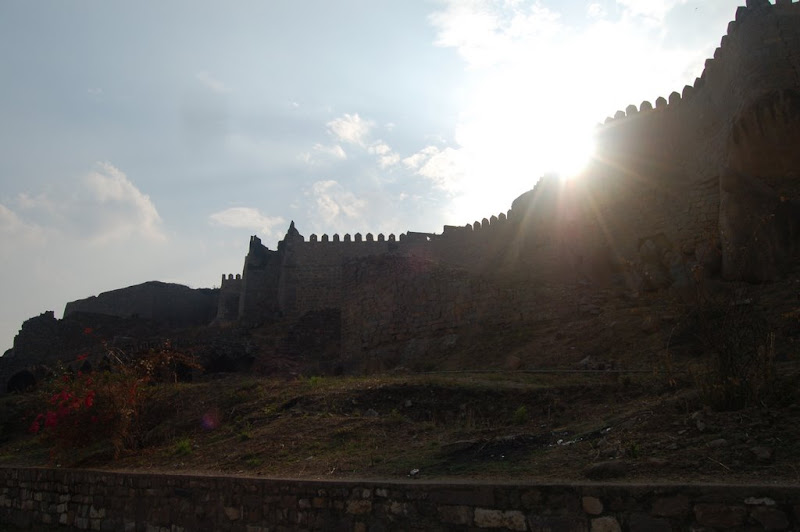
Robyn
The tour guide was really funny - though, apparently, only to me and Robyn. He kept yelling "Challo! Ayie!" ("Let's go! Please come!") every five minutes.
The White Temple was built in the 1970's. You take off your shoes to enter and get to enjoy walking barefoot on the smooth cold white Marble.
Photos at the white temple, including one I took at night when I was there with my roommates
Women selling coconuts for Pooja purposes outside the Temple; school kids waiting to go in the Temple.
Cell phones and cameras are strictly forbidden inside the white temple. When you walk in the locker room, you can hear a handful of cell phones ringing at once from these shelves.
We drove around the Charminar but didn't get out. I took this photo another time when I went there with my roommates.
The Nizam Museum
Reason there are no photos from inside the Nizam museum (Rs50 = $1.25 per photo)
Lots of places in India charge extra above the ticket price for cameras and video cameras. Also many sites charge tourists ten times more than Indians. I made my case for paying Indian prices - I work and live in India - and everywhere but Golkonda let me in at Indian ticket price.
Nizam Palace
We stopped for a much-needed lunch at a restaurant with a veg buffet. I was eating with my hands (as is the tradition in South India) and felt something in the baigan bartha that didn't feel like eggplant. I brought it up to the counter and asked them what it was. "It's Brinjal ('eggplant' in India English), ma'am." "No," I said. "This is meat." About five other workers came over and began to examine the hunk of flesh on my plate, and finally came to the conclusion that it's mutton (lamb). Another worker made a new plate from the buffet for me and tried to hand it to me, but I refused to take it. I had almost finished eating anyway, and could easily make myself another plate if I had wanted (after all, that's how I got the first two plates, isn't it). As I am used to complaining at restaurants both because I work in one and because I was vegan for five years and got used to sending about 50% of food ordered at restaurants back for alterations, I went on. "There was mutton in my brinjal! This is a veg buffet!" I said. "This is India! You can't do this here!" As if I had said the magic words, a worker refunded my buffet money (to Robyn, who had paid) and gave both me and Robyn mango ice cream with carmalized apricot (mmmmm). Seriously though... who does that in India.
Golkonda Fort
Golkonda is beautiful. There are around 350 stairs to get to the top. The Temple is on the way up, the pavilion building structures are at the top, and has giant Andhra rocks everywhere. There were a handful of teenage boys trying to take out photo or trying to take photos with us (we refused, but allowed some girls to take photos with us). There were many young couples here, and at the other sites we visited, seemingly hiding in a tourist venue where no one they know would find out about their secret trysts.
Sunday, March 16, 2008
So-called enhanced interrogation techniques
Although I often use terms like "third world" and "developing" in my speech and writing in the interest of simplifying communication, I find these terms problematic. While I admit that I have seen India literally developing before my eyes during my 7 months here, the idea that a country is "developing" implies that they must try to become like "us" - as if they development were a linear process and and each country falls somewhere on that line. The term also implies that one developed nation is superior, while another developing or undeveloped country is behind, lacking, inferior, or, as they say in India, "backwards."
I take issue with the idea that one place is backwards while another is not. People create a mental link between the idea of infrastructural development and the idea of moral development, and moral, political, and structural development. In their minds, and in the discourse and terminology used, developing country = developing people. We read about people dying of AIDS, malaria, getting hit by buses, women burned alive by husbands, children trafficked for sex tourism purposes (as if these problems don't happen in the "developed" world). But yes, there are many problems with corruption and lack of infrastructure in India, which often has detrimental results for citizens, including in sickness, death, acute poverty, failure of aid to reach those for whom it is intended, and a host of other problems. Modi, the head of the Indian state of Gujarat (and was also chief minister during the Gujarat riots and has been criticized for his role in this) whom an Indian coworker once equated with Hitler, perhaps admitted to killing his opponent and justified it saying he deserved it and he did what needed to be done.
But what about the developed world? Is there such a vast distinction in policies and attitudes of our politicians? Several days ago when I read that Bush vetoed an anti-torture bill, or "interrogation limits" for the CIA, these questions were what ran through my mind. I know that "water-boarding" has gotten a lot of attention in recent months, but the others are equally if not more disturbing to me.
This list is taken from a BBC article on Bush's recent veto of the anti-torture bill.
My point is not exactly that India is not developing, or that America is more backward than it pretends... let's just say that in my opinion, Bush and Modi are in a similar camp.
I take issue with the idea that one place is backwards while another is not. People create a mental link between the idea of infrastructural development and the idea of moral development, and moral, political, and structural development. In their minds, and in the discourse and terminology used, developing country = developing people. We read about people dying of AIDS, malaria, getting hit by buses, women burned alive by husbands, children trafficked for sex tourism purposes (as if these problems don't happen in the "developed" world). But yes, there are many problems with corruption and lack of infrastructure in India, which often has detrimental results for citizens, including in sickness, death, acute poverty, failure of aid to reach those for whom it is intended, and a host of other problems. Modi, the head of the Indian state of Gujarat (and was also chief minister during the Gujarat riots and has been criticized for his role in this) whom an Indian coworker once equated with Hitler, perhaps admitted to killing his opponent and justified it saying he deserved it and he did what needed to be done.
But what about the developed world? Is there such a vast distinction in policies and attitudes of our politicians? Several days ago when I read that Bush vetoed an anti-torture bill, or "interrogation limits" for the CIA, these questions were what ran through my mind. I know that "water-boarding" has gotten a lot of attention in recent months, but the others are equally if not more disturbing to me.
This list is taken from a BBC article on Bush's recent veto of the anti-torture bill.
CIA 'ENHANCED INTERROGATION' TECHNIQUES
Water-boarding: prisoner bound to a board with feet raised, and cellophane wrapped round his head. Water is poured onto his face and is said to produce a fear of drowning
Cold cell: prisoner made to stand naked in a cold, though not freezing, cell and doused with water
Standing: Prisoners stand for 40 hours and more, shackled to the floor
Belly slap: a hard slap to the stomach with an open hand. This is designed to be painful but not to cause injury
My point is not exactly that India is not developing, or that America is more backward than it pretends... let's just say that in my opinion, Bush and Modi are in a similar camp.
Thursday, March 13, 2008
Lucknow and the Sleeperclass Express
The IAWS (Indian Association of Women's Studies) national conference was held in February in Lucknow, a city in the North state of Uttar Pradesh. My work sent me and eight coworkers to attend. As the office was paying for our transport, we took a direct train in sleeperclass. Sleeperclass is not as classy as it sounds; it comes after 1st class AC (air conditioned)(pointless; for the money you may as well fly); 2nd class AC (how I traveled before; has two tier bunks, six total in one berth) and 3rd AC (also tried this before; two three-tiered bunks and one two-tiered bunk, so eight total in one berth). Sleeperclass is also eight in a berth, but no sheets, pillows, face towels or blankets are provided (as is the case in 1st-3rd). It is also packed with people: those who have tickets it general unreserved (which comes after sleeperclass, and is supposed to be miserable), those who have unconfirmed reservations (so no reserved beds). Also in sleeperclass the windows have bars and windows that you can put up and look through, enjoy the breeze, throw trash out of, etc (while in 1st-3rd class there are permanent hard plastic windows that don't open). People who have unreserved or unconfirmed ticket, sit on other people's beds during the day, huddle together on the floor, and sometimes try and crawl into other people's beds in the night (so I've heard).
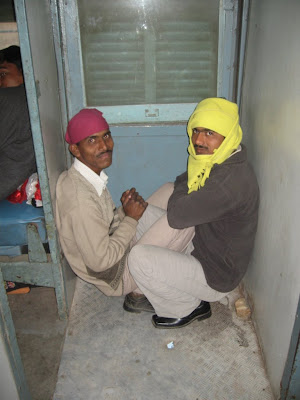
Tuesday morning, we got on the train at 8:00am with plenty of home cooked food, fruit and snacks in preparation of our 32-hour journey. We ran onto the train and desperately looked for places to put our luggage. The group was spread out between two cars, and none of our seats were together; after trading with various people over the hour we finally had several of us spread out in three berths in the two cars. One of these berths had two Muslim women with a 7-month old baby, and another had a 1 1/2 year old. The older baby, Arpita, that I am holding in the photo had a deep belly laugh that was contagious. She laughed every time she saw my face, and after about 20 hours on the train took to calling me "Amma" (Mother in Hindi). After a couple hours, one of my coworkers picked up the 1 1/2 year old and took her to the berth our other coworkers were in (in the same car). We had the babies play together, and then brought the baby to the other car to see our other coworkers. I was really nervous - it was one thing to bring her to another berth, but to another train car without permission?! Once in the other car, my other coworkers passed her around, fed her raisins, and enjoyed her laugh. I just imagined what would happen if some stranger on a train took a fellow passenger's baby to another train car and gave it food! (We'd probably create panic among the parents and then get arrested.) But in India, you can generally play with babies on the train; whenever I see babies and little kids in public, whether waiting in a queue, on the train or bus, at the mall, on the street, I will go up to them and touch their cheeks, let them wrap their little fingers around my pinky finger, ask them "Me peru emeti?" (Telugu for "What's your name?") - just because I can.
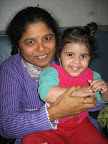
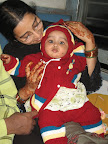
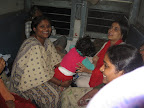
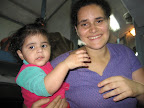
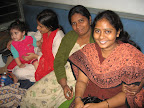
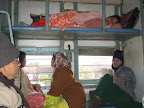
Sleeperclass is a trip. Every 5-15 seconds, LITERALLY, there is someone, whether from the cafeteria car or someone who has just climbed on the train, selling something. All day and into the night you hear, "Chai, coffee, chai chai" "samose!" "cutlet, omelet" "pani water" and various languages of people selling fruit, chips, snacks, groundnuts, ice cream, keychains, newspapers, magazines, toothbrushes, luggage chains, carved wooden objects, people begging for money, singing songs for money, cleaning your berth with a broom for money, hijras clapping the signature "hijra clap" and demanding money, and every 15 hours or so a ticket collector asking to see a ticket.
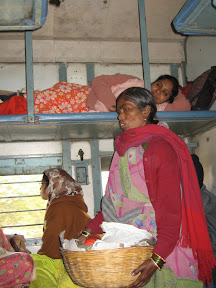
The amount of people at first had me feeling sweaty and a bit claustrophobic, but after the train began moving I could walk in the aisles and arrange a seat near my coworkers (the beds are seats during the day, and you put up the backrest as the middle bunk when people go to sleep at night, so there's generally about 10 people sitting in a berth at any given time). You can go stand in the doors in between the train cars and look out as the landscape passes by, which is great if you need a breather, a photo, or just to relax and enjoy the beauty, garbage, people, huts, buildings, animals, and other sights out the train window.
Lucknow was COLD. I forgot what the cold felt like (it's now summer in Hyderabad, as of about 10 days ago). My coworkers were not used to the weather and some were unprepared (I advised some to bring closed-toed shoes and socks but they told me they didn't own either, since they are unnecessary in Hyderabad). Almost all of my coworkers have never seen snow.
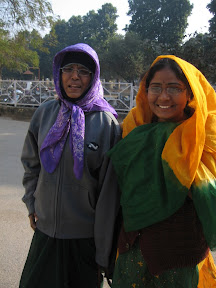
The women's studies conference was amazing. It was incredible to hear presentations on the research being done here on women and gender issues. A lot of it touched on issues I had learned about during my senior year, including transgender issues, intersexed people, disability and sexuality, disability and feminism, feminism as elite (they talked about being a "caste" feminist, which I took to mean the Indian women's movement addressing the needs of upper caste women and leaving out dailt women's needs).
On the last day I met up with my friend Rachel, who is also an AJWS World Partners Fellow and whose placement is in Lucknow (the city that I was originally supposed to be placed in). We went shopping with a few of my coworkersOur coworkers bought us Indian priced tickets to go to this mosque (under a dollar, instead of foreigner's price of more than $7.00). We wrapped our heads and they put bindis on us (kind of a mixed message becauseif we were trying to look Muslim the bindi doesn't make so much sense, though sometimes Hindu women cover their heads, like when entering a temple or when the sun is blazing). We walked in and they said "They are English they can't use Indian tickets" but then they saw our bindis and said "they are Indian" (at least this is what happened according to my coworker Anu who dealt with the ticket rippers).
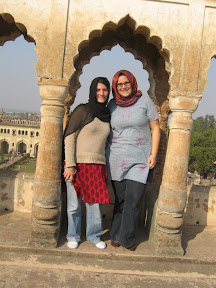
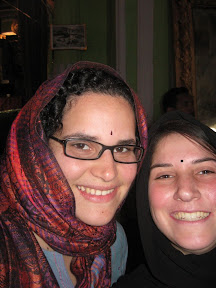
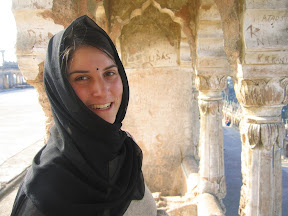
So maybe we don't really pass as Indian.. but I still think Rachel looks Muslim Indian with her head cover.
More photos from the day, sightseeing at Bara Imambara:
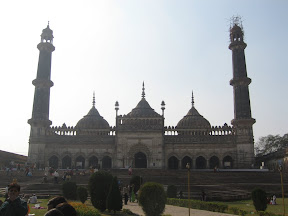

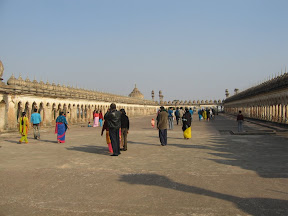
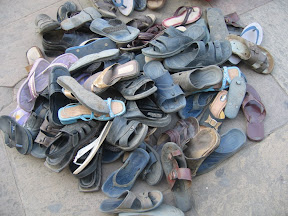
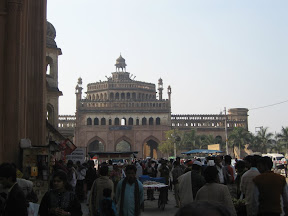
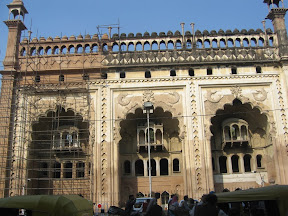
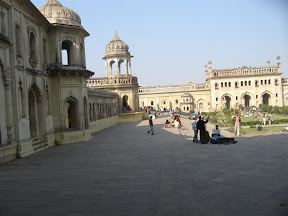
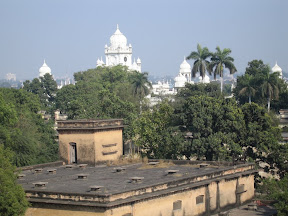
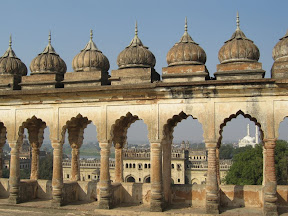
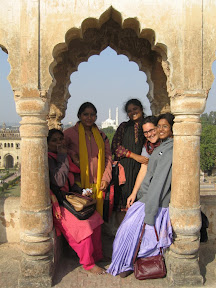
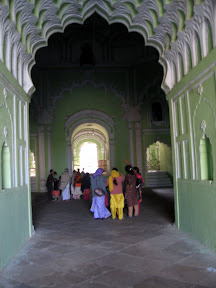
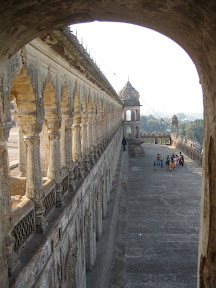

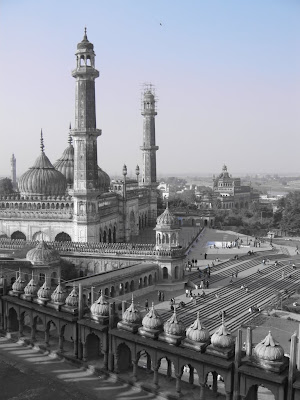
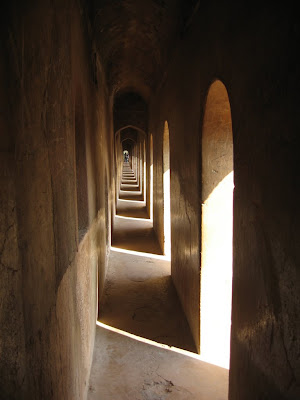
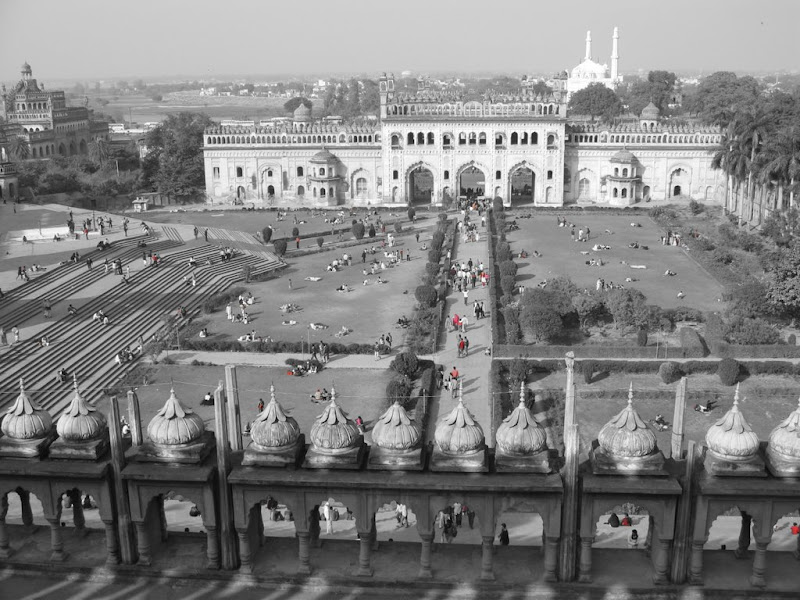
After having dinner with Rachel and a one-time-use clay pot of Kulfi (pista ice cream), I took an auto back to the center where we were staying. It must have been an extremely auspicious time because we passed 4 different wedding ceremonies in the 20-minute ride, and saw several other venues with "Ramesh weds Sita" signs (indicating other weddings).
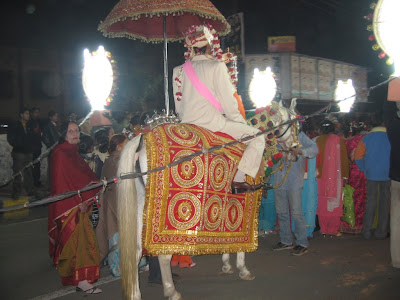
On the 32- hour train back to Hyderabad, I took a bunch of photos when we came into train stations, and out the window of the moving train. As has become my custom for traveling, I will include them in a photo montage...
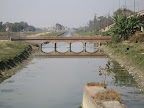
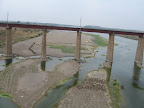
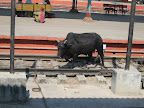
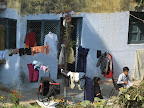
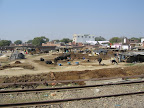
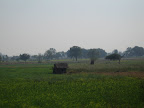
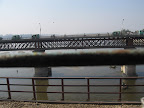
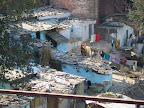
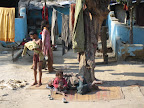
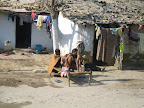
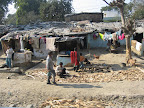
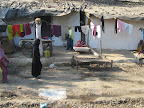
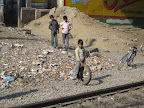
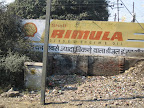
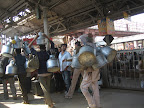
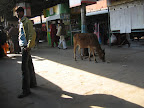
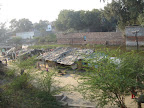
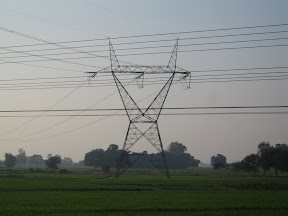
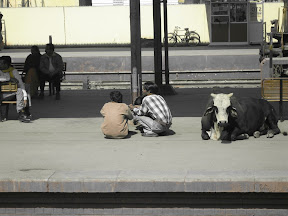
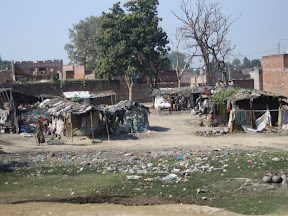
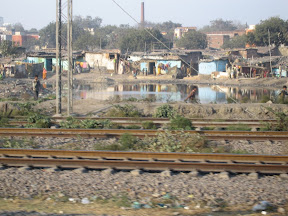
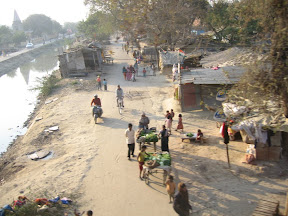
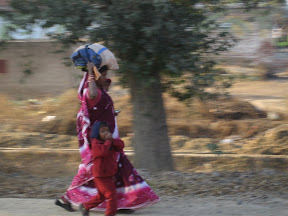
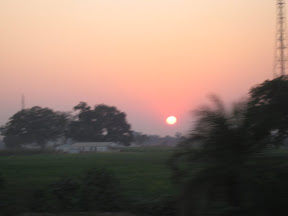
At one point when the train stopped, people waited at the train crossing barriers. Some people simply grabbed their bike/child/goat, climbed aboard, and went out the other side.
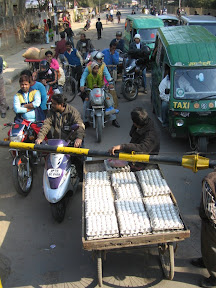
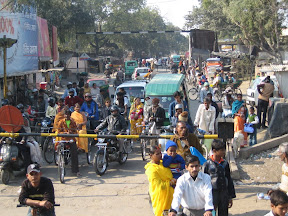
The living end
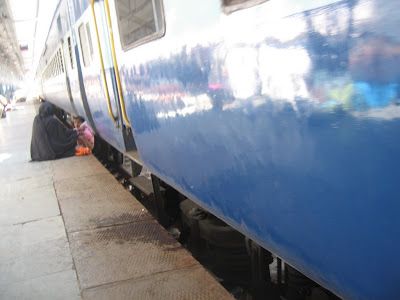
Men huddling by the door on the train floor
Tuesday morning, we got on the train at 8:00am with plenty of home cooked food, fruit and snacks in preparation of our 32-hour journey. We ran onto the train and desperately looked for places to put our luggage. The group was spread out between two cars, and none of our seats were together; after trading with various people over the hour we finally had several of us spread out in three berths in the two cars. One of these berths had two Muslim women with a 7-month old baby, and another had a 1 1/2 year old. The older baby, Arpita, that I am holding in the photo had a deep belly laugh that was contagious. She laughed every time she saw my face, and after about 20 hours on the train took to calling me "Amma" (Mother in Hindi). After a couple hours, one of my coworkers picked up the 1 1/2 year old and took her to the berth our other coworkers were in (in the same car). We had the babies play together, and then brought the baby to the other car to see our other coworkers. I was really nervous - it was one thing to bring her to another berth, but to another train car without permission?! Once in the other car, my other coworkers passed her around, fed her raisins, and enjoyed her laugh. I just imagined what would happen if some stranger on a train took a fellow passenger's baby to another train car and gave it food! (We'd probably create panic among the parents and then get arrested.) But in India, you can generally play with babies on the train; whenever I see babies and little kids in public, whether waiting in a queue, on the train or bus, at the mall, on the street, I will go up to them and touch their cheeks, let them wrap their little fingers around my pinky finger, ask them "Me peru emeti?" (Telugu for "What's your name?") - just because I can.
Sleeperclass is a trip. Every 5-15 seconds, LITERALLY, there is someone, whether from the cafeteria car or someone who has just climbed on the train, selling something. All day and into the night you hear, "Chai, coffee, chai chai" "samose!" "cutlet, omelet" "pani water" and various languages of people selling fruit, chips, snacks, groundnuts, ice cream, keychains, newspapers, magazines, toothbrushes, luggage chains, carved wooden objects, people begging for money, singing songs for money, cleaning your berth with a broom for money, hijras clapping the signature "hijra clap" and demanding money, and every 15 hours or so a ticket collector asking to see a ticket.
I cannot tell what this woman is selling; probably nuts or flavoured fried dal (lentils) judging by her basket and her scooping cup.
The amount of people at first had me feeling sweaty and a bit claustrophobic, but after the train began moving I could walk in the aisles and arrange a seat near my coworkers (the beds are seats during the day, and you put up the backrest as the middle bunk when people go to sleep at night, so there's generally about 10 people sitting in a berth at any given time). You can go stand in the doors in between the train cars and look out as the landscape passes by, which is great if you need a breather, a photo, or just to relax and enjoy the beauty, garbage, people, huts, buildings, animals, and other sights out the train window.
Lucknow was COLD. I forgot what the cold felt like (it's now summer in Hyderabad, as of about 10 days ago). My coworkers were not used to the weather and some were unprepared (I advised some to bring closed-toed shoes and socks but they told me they didn't own either, since they are unnecessary in Hyderabad). Almost all of my coworkers have never seen snow.
My coworkers, Santi and Anu, all bundled up.
The women's studies conference was amazing. It was incredible to hear presentations on the research being done here on women and gender issues. A lot of it touched on issues I had learned about during my senior year, including transgender issues, intersexed people, disability and sexuality, disability and feminism, feminism as elite (they talked about being a "caste" feminist, which I took to mean the Indian women's movement addressing the needs of upper caste women and leaving out dailt women's needs).
On the last day I met up with my friend Rachel, who is also an AJWS World Partners Fellow and whose placement is in Lucknow (the city that I was originally supposed to be placed in). We went shopping with a few of my coworkersOur coworkers bought us Indian priced tickets to go to this mosque (under a dollar, instead of foreigner's price of more than $7.00). We wrapped our heads and they put bindis on us (kind of a mixed message becauseif we were trying to look Muslim the bindi doesn't make so much sense, though sometimes Hindu women cover their heads, like when entering a temple or when the sun is blazing). We walked in and they said "They are English they can't use Indian tickets" but then they saw our bindis and said "they are Indian" (at least this is what happened according to my coworker Anu who dealt with the ticket rippers).
So maybe we don't really pass as Indian.. but I still think Rachel looks Muslim Indian with her head cover.
More photos from the day, sightseeing at Bara Imambara:
After having dinner with Rachel and a one-time-use clay pot of Kulfi (pista ice cream), I took an auto back to the center where we were staying. It must have been an extremely auspicious time because we passed 4 different wedding ceremonies in the 20-minute ride, and saw several other venues with "Ramesh weds Sita" signs (indicating other weddings).
Groom riding a white horse
On the 32- hour train back to Hyderabad, I took a bunch of photos when we came into train stations, and out the window of the moving train. As has become my custom for traveling, I will include them in a photo montage...
At one point when the train stopped, people waited at the train crossing barriers. Some people simply grabbed their bike/child/goat, climbed aboard, and went out the other side.
The living end
(pooping onto the tracks)
Subscribe to:
Comments (Atom)
Links
About Me
- Mylarobin
- United States
- I wrote this blog while working at a women's resource center in Hyderabad, India through a social justice fellowship through American Jewish World Service.
